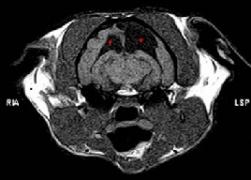Seizures

Seizures
Seizures are a frightening medical condition. Like lightning, a seizure strikes out of the blue, due to a short circuit in the brain. After a minute or two, the brain resets itself. Even though seizures commonly last a minute or two, watching your pet lose consciousness, twitch, jerk, and maybe even lose bowel and bladder control is scary.
Seizures brought Ruby, a sleek black cat, to see Dr. Chad West of The Animal Medical Center’s Neurology Service.
Two years before she came to The AMC, Ruby’s primary care veterinarian diagnosed her with a seizure disorder. Treatment with an anticonvulsant medication controlled the seizures, but just prior to her visit at The AMC, the seizures became more frequent.
The cause of seizures discovered
While Ruby was not having a seizure when she arrived at The Animal Medical Center, her physical and neurological examination demonstrated that she had weakness of the left side of her body, and there was evidence that the pressure on her brain was not allowing adequate blood flow to this vital organ. The combination of Ruby’s signs represented a potentially life-threatening situation and the neurology team immediately performed an MRI to evaluate Ruby’s brain for the cause of her issues and to develop the best therapeutic plan.
This panel from Ruby’s MRI shows the large areas of water on the brain marked with red stars.
Water on the brain
Ruby’s diagnosis was obstructive hydrocephalus (high pressure water on the brain) associated with head trauma when Ruby was a youngster. In addition to the anticonvulsant medication that Ruby had been taking, steroid treatment was instituted to decrease the pressure on Ruby’s brain and to help her have a normal quality of life, despite decreased cerebral blood flow. The decision was made to also add a second anticonvulsant drug, Keppra, to ensure better seizure control.
Trying a new drug
Keppra is a relatively new anticonvulsant medication, and at the time of Ruby’s presentation and diagnosis, very few cats in the world had been treated with Keppra to help with seizure control. In addition to being an extremely safe medication with limited side effects, Keppra has the ability to protect the brain during times when there is abnormal blood flow.
Treating cats with anticonvulsant medications can be tricky. Veterinary neurologists focus on seizure control without losing sight of the cat’s quality of life. Their goal is to have them behave normally without having seizures. Generally, attaining the appropriate balance takes a few minor adjustments in dose. Some anticonvulsant medications also require regular blood test monitoring to ensure that other organs are not being harmed by the anticonvulsant drugs.
The high dosage of phenobarbital, Ruby’s original anticonvulsant medication, put her at risk for developing liver failure. The addition of Keppra, coupled with lowering the pressure on Ruby’s brain, allowed reductions in her phenobarbital dosage to a safer level and improved her overall quality of life.
The outlook
Even though Ruby will require life-long medications, she has done fabulously well in the four years since she first came to The AMC and her neurologists expect her to continue to do well.
The successful treatment of Ruby is an excellent example of why finding the right specialist is critical when your pet has a serious disease. The experience, knowledge and technology of The AMC neurology team allowed an accurate diagnosis and novel treatment resulting in an excellent outcome.


































